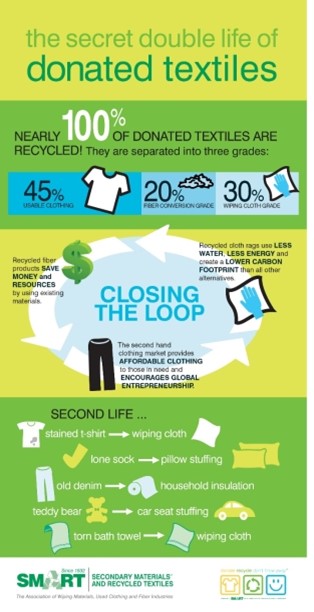Donate, recycle – don’t throw away your old clothing, shoes and more
For this year’s 51st Earth Day on April 22, don’t forget about the importance of reusing and recycling textiles. According to the Secondary Materials and Recycled Textiles Association (SMART), a global organization of companies involved in the reuse and recycling of textiles and related secondary materials, 95 percent of textiles (any fabric made of interlacing fibers) can be reused and recycled: old clothing (including undergarments), curtains, bath towels, bedsheets, pillowcases, table linens, shoes, stuffed animals, scarves, pet beds and more.
The largest recruiter to the environmental movement, Earth Day brings together people in 192 countries from all over the globe, making it the world’s most widely observed civic event, according to EARTHDAY.ORG. This year, Earth Day is being treated as an opportunity to declare the day a global recommitment to save our planet, its people, and open a revolutionary new era of healing, restoration, learning, and unity.
Clothing and household textiles currently make up 6.3 percent of the waste stream or the equivalent of 81 pounds per person thrown away annually in the US. Meanwhile, textile reuse and recycling reduces the need to create more landfill space, reduces pollution created by incinerators, saves the environment from tons of harsh chemicals and more.
One way to make a difference is by giving your textiles a second life. Majority of donated textiles are reused and recycled into three grades: usable clothing, fiber conversion grade and wiping cloth grade. This means a lost sock can be made into pillow stuffing, ripped denim can transform into household insulation, an old towel can become a wiping rag and your barely-worn prom dress can get a second life with a teen going to their first dance.
Any clothing, household textile or commercial linen textile, as long as it is clean, dry odor-free, can be reused and recycled. Even if the item is stained, torn, overly worn or out-of-date, do not throw it away; it has a use in the textile recycling industry. Only items that are wet (mildewed) or have been used with a solvent-type liquid such as gasoline or Goof Off cannot be recycled.
So, what should consumers do with their unused or otherwise unwanted textiles? SMART recommends looking for clothing collection boxes their neighborhoods. These bins are often operated by companies, like SMART members, who follow a strict code of conduct and are deeply committed to recycling and waste reduction. Through their business activities, SMART members are responsible for diverting billions of pounds of used textiles and other household wastes from landfills each year. Consumers may also check their favorite local charity or thrift store about collection locations or other socially-distant way to drop off their unwanted textiles. SMART encourages those concerned about the environmental impact of textile waste to seek out creative ways to reuse or “upcycle” their items throughout the home.
When it comes to refreshing Spring wardrobes, SMART recommends consumers consider shopping secondhand at well-known thrift stores, like Savers, and charities like Goodwill, Salvation Army or St. Vincent DePaul. According to ThredUp, one of the largest online retail businesses for secondhand shopping, the practice displaces the need for new clothing production and diverts items from landfills. Further, buying one used item reduces its carbon, waste, and water footprints by 82 percent.
“There are many options available to those who want to give back this Earth Day by way of thinking about their textile waste habits,” says Jackie King, executive director of SMART. “While there are many in-person ways to celebrate this year that will abide by updated safety guidelines, textile recycling is a fun way for families who aren’t quite ready to step out into the community to participate and make a difference for the environment.”
For more information on SMART and the work of its members, for-profit businesses in the textile reuse and recycling industry, visit www.smartasn.org. Please direct media inquiries for SMART to Patrick Seidl at 443-764-6406 or by email at [email protected]
About SMART
Established in 1932, the Secondary Materials and Recycled Textiles Association (SMART) is an international nonprofit trade association that strengthens the economic opportunities of its diverse membership by promoting the interdependence of the for-profit textile recycling industry segments and providing a common forum for networking, education and trade. SMART members use and convert recycled and secondary materials from used clothing, commercial laundries and non-woven, off spec material, new mills ends and paper from around the world. SMART member companies create thousands of jobs worldwide, proving each day you can make money by being socially responsible.
About EARTHDAY.ORG
EARTHDAY.ORG’s mission is to diversify, educate, and activate the environmental movement worldwide. Growing out of the first Earth Day (1970), EARTHDAY.ORG is the world’s largest recruiter to the environmental movement, working with more than 150,000 partners in 192 countries to build environmental democracy. More than 1 billion people now participate in Earth Day activities each year, making it the largest civic observance in the world. Learn more at earthday.org.





